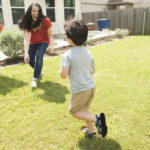Alzheimer’s disease and related dementias interfere not only with memory but also damage the brain’s ability to understand what the eyes see. People with dementia can look right into the face of their dearest relative and fail to recognize that intimately familiar person.
Even a child, spouse, or sibling may go unacknowledged. That can be very painful for the devoted caregiver who is struggling with grief over their loved one’s illness.
Why it happens
Our brains like to come up with explanations for things we don’t understand or expect, so sometimes the unrecognized caregiver is transformed into a different person.
Get expert advice on this topic and more from the experts at ChristianaCare’s Swank Center for Memory Care and Geriatric Consultation in the Swank Podcast Series.
One in six people with Alzheimer’s disease or other dementias develop this serious difficulty with identification, and this “delusional misidentification” can take some very disturbing forms.
The formerly beloved caregiver may be misidentified as a different relative, a stranger, a celebrity, or sometimes even as an enemy. This misidentification can be devastating and, in extreme cases, even dangerous.
Here are ways to manage:
Let yourself grieve
It’s sad when a loved one loses his or her memories and does not recognize us. It’s OK to mourn.
Keep in mind, too, that recognition ability can wax and wane. On a good day, or during a better moment on a bad day, recognition may return.
You will see, too, that even when the name and relationship aren’t recalled, a person with dementia often remembers the emotional essence of your former relationship and will be calmed and comforted by your presence.
Get the facts
Talk to your loved one’s doctor about what type of memory impairment is causing the lack of recognition and the best ways to manage it. Sometimes behavioral interventions will help. For example, try announcing your presence (“Honey, I’m back to see you.”) outside the room before you enter. Voice recognition, for some people, outlives damaged visual recognition.
If you are unrecognized, it may evoke an unexpected reaction – fear, uncooperativeness, even aggression or an attempt to escape. Be sure to think about your own safety and do not take risks. If you feel in danger, trust your gut and get the help you need. Having someone else present when you offer your loved one personal care may be necessary for everyone’s safety.
When behavioral efforts fail, medication still offers some hope. Although no specific medication is of proven benefit in all cases of failed recognition or delusional misidentification, your health care provider may be able to suggest the safest medications that may be of help.
Practice patience
Correcting the impaired person rarely produces positive results. Instead, show that you understand that the experience is upsetting for him or her. Do not insist on acknowledgment of your correct identity, but consider the confusing dilemma that a person with dementia endures as they try to make sense of an unfamiliar and perplexing world.
Share photos and videos
Since your loved ones may recall their youth, show them photos and videos, and share stories. Pick a consistent time for this exercise. It may help trigger memories.
ChristianaCare is currently doing a study on the use of a non-medication device to help improve recognition. To inquire, call 302-320-5608.
Author James M. Ellison, M.D., MPH, is The Swank Foundation Endowed Chair in Memory Care and Geriatrics.



